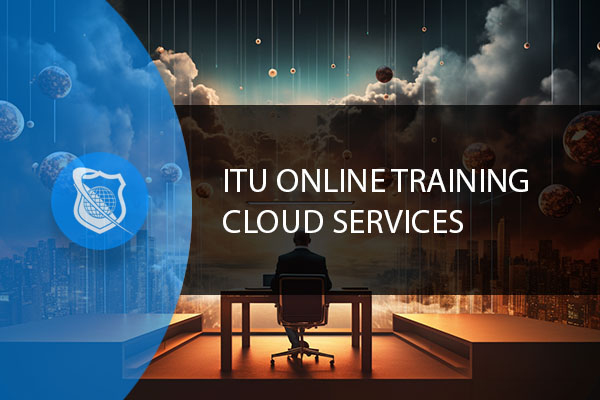What Is Typographic Ligature?
Definition: Typographic LigatureA typographic ligature is a design feature in typography where two or more characters are combined into a single glyph, enhancing readability, aesthetic appeal, or both. Ligatures are

Cloud computing has become a cornerstone of modern technology and Microsoft Azure stands out as a leader in cloud offerings. It offers scalable, flexible, and cost-effective solutions for data storage and management. Among the leading names in this domain is Microsoft Azure, a robust cloud service provider that has been redefining the industry since its inception. Azure stands out for its comprehensive range of services and its commitment to innovation and enterprise solutions.

Become a highly skilled Microsoft Azure Administrator with our Azure administrator Career Path training series. This path include the core skills for Cloud, Network and Security with the CompTIA courses and then follows-up with our comprehensive AZ-104 Azure Administrator course. Elevate your career today.
Azure is not just a cloud platform; it’s an extensive ecosystem offering over 200 products and services. This platform supports various programming languages and frameworks, making it a versatile option for different user needs. When compared to other major cloud providers like Amazon Web Services (AWS) and Google Cloud Platform (GCP), Azure holds a unique position, especially in terms of enterprise integration and service offerings.
Microsoft Azure is more than just a public cloud platform; it’s a comprehensive suite of over 200 products and services accessible over the internet. What sets Azure apart from competitors like Amazon Web Services (AWS) and Google Cloud Platform (GCP) is its seamless integration with Microsoft’s legacy applications and a strong focus on enterprise needs, making it a go-to choice for many Fortune 500 companies.
Azure’s market position is formidable. Since its inception in 2008, it has grown rapidly to become the second-largest cloud provider, trailing just behind AWS. In terms of market share, as of the second quarter of 2021, AWS led with 31%, followed by Azure at 22%, and Google Cloud at 8%, according to Statista.
From its beginnings in 2008, Azure has shown remarkable growth. Key milestones in its journey include significant expansions in services and global reach. In the competitive landscape, Azure holds a significant market share, standing strong against AWS and Google Cloud. Industry reports and market analyses reveal Azure’s growing influence and adoption across sectors.
Azure’s popularity in the enterprise space can’t be overstated. With Microsoft claiming that 95% of Fortune 500 companies use Azure, it’s clear that its appeal lies in its ability to integrate well with existing Microsoft solutions – a crucial factor for businesses with legacy systems. Azure’s strength in hybrid cloud deployments also sets it apart, offering organizations a balanced blend of on-premise and cloud computing.
Azure’s popularity in enterprises can be attributed to several key factors that align well with the needs and challenges of large organizations. Here are some of the primary reasons for Azure’s widespread adoption in the enterprise sector:
These factors combined make Azure a compelling choice for enterprises seeking a robust, secure, and comprehensive cloud platform that aligns with their business needs and strategic goals.

At ITU, we offer an exclusive Cloud Computing training series designed to prepare you for certification and/or to help you gain knowlege of all Cloud based platforms including AWS, Azure and Gooogle Cloud.
Get access to this exclusive Cloud Computing Training today.
The interest in Azure extends beyond enterprises. There’s a noticeable surge in Azure-related training and certifications, indicating a growing demand for skills in this area. The benefits of migrating to Azure, such as cost savings and reduced complexity, are significant motivators for this increased interest.
According to A Cloud Guru’s report, there’s a significant increase in the number of cloud engineers seeking Azure training – a trend indicative of the platform’s growing importance. Migrating to Azure brings tangible benefits, notably in reducing the cost and complexity of managing on-site resources.
To break down the top 20 products available on Azure, we can categorize them based on their general usage and popularity among users. Azure, being a comprehensive cloud platform, offers a wide range of services spanning various categories such as compute, storage, databases, AI & Machine Learning, IoT, and many others. Here’s an overview of some of the top products and services in Azure:
These are just some of the key products and services offered by Azure. Each of these services caters to different aspects of cloud computing and helps businesses and developers to build, deploy, and manage applications more efficiently in the cloud.
Azure’s infrastructure is a testament to its global reach and technological prowess. With a network of regions and data centers spread across the globe, Azure ensures high availability and regional compliance. The strategic placement of these regions and availability zones underscores Azure’s commitment to providing resilient and efficient cloud services.
Azure’s infrastructure is a marvel of modern cloud computing. With over 67 regions and more than 160 physical data centers worldwide, it boasts a comprehensive global presence. Each Azure region consists of multiple data centers equipped with independent power, cooling, and networking, ensuring high availability and reliability.
Azure also addresses specific local needs through its geographies and government regions. These are designed to meet data residency and compliance requirements, with government regions offering additional security for sensitive data.

Your career in information technology last for years. Technology changes rapidly. An ITU Online IT Training subscription offers you flexible and affordable IT training. With our IT training at your fingertips, your career opportunities are never ending as you grow your skills.
Plus, start today and get 30 days for only $1.00 with no obligation. Cancel anytime.
Not all Azure services are created equal. While most regions offer a broad range of services, some specialized services like Azure Machine Learning may be limited to specific regions. Azure’s government regions are particularly noteworthy, offering stringent compliance with government guidelines and enhanced security features.
Azure offers a variety of diverse services and government-specific offerings, catering to the unique needs of public sector entities. These services are designed to meet rigorous compliance standards, ensure high levels of security, and provide tools and functionalities tailored for government use. Here’s an overview of some of these offerings:
These services are part of Azure’s commitment to meeting the specific needs of government entities, ensuring that they can leverage cloud technologies while adhering to the highest standards of security and compliance. They enable government agencies to innovate, improve operational efficiencies, and provide better services to citizens while maintaining the integrity and confidentiality of sensitive information.
In conclusion, Microsoft Azure is more than a cloud service provider; it is a driving force in the cloud computing industry. Its continued evolution, focus on enterprise needs, and expansion into emerging technologies like AI and IoT position Azure as a key player in shaping the future of cloud services.
For those looking to deepen their understanding of Azure, numerous resources are available. From official Microsoft certification courses to third-party training platforms, there are ample opportunities to gain expertise in Azure.
As we look ahead, Azure’s role in cloud computing seems destined to grow, offering exciting possibilities for businesses and individuals alike. Microsoft Azure, with its rich history and continual innovation, is not just a cloud service provider; it’s a pivotal force in the cloud computing domain, shaping the future of digital infrastructure.
Understanding key terms in the field of Microsoft Azure and cloud computing is crucial for anyone working in or interested in this area. These terms not only define the fundamental concepts and technologies involved but also enable professionals to effectively communicate and stay updated with the latest trends and developments in this rapidly evolving sector.
| Term | Definition |
|---|---|
| Azure | A cloud computing service created by Microsoft for building, testing, deploying, and managing applications and services through Microsoft-managed data centers. |
| Cloud Computing | The delivery of different services through the Internet, including data storage, servers, databases, networking, and software. |
| Virtual Machine (VM) | An emulation of a computer system that provides the functionality of a physical computer. |
| Azure Active Directory | Microsoft’s cloud-based identity and access management service. |
| Azure DevOps | A set of development tools and services offered by Microsoft Azure to support software development projects. |
| Infrastructure as a Service (IaaS) | A form of cloud computing that provides virtualized computing resources over the internet. |
| Platform as a Service (PaaS) | A cloud computing model that provides a platform allowing customers to develop, run, and manage applications without the complexity of building and maintaining the infrastructure. |
| Software as a Service (SaaS) | A software distribution model in which a cloud provider hosts applications and makes them available to end-users over the internet. |
| Azure Kubernetes Service (AKS) | A managed container orchestration service, based on Kubernetes, available on the Microsoft Azure public cloud. |
| Azure Functions | A serverless compute service that lets you run event-triggered code without having to explicitly provision or manage infrastructure. |
| Blob Storage | A service for storing large amounts of unstructured data, such as text or binary data, that can be accessed from anywhere in the world. |
| Azure SQL Database | A fully managed relational database service that’s a part of Microsoft Azure. |
| Azure Cosmos DB | Microsoft’s globally distributed, multi-model database service. |
| Azure Resource Manager | A service that provides a management layer that enables you to create, update, and delete resources in your Azure account. |
| Azure Logic Apps | A cloud service that helps you schedule, automate, and orchestrate tasks, business processes, and workflows when you need to integrate apps, data, systems, and services across enterprises or organizations. |
| Azure Machine Learning | A cloud service for training, deploying, automating, managing, and tracking machine learning models. |
| Azure IoT Hub | A managed service that acts as a central message hub for bi-directional communication between your IoT application and the devices it manages. |
| Azure Stack | A portfolio of products that extend Azure services and capabilities to your environment of choice—from the data center to edge locations and remote offices. |
| Network Security Group (NSG) | A feature in Azure that allows you to filter network traffic to and from Azure resources in an Azure virtual network. |
| Azure Service Fabric | A distributed systems platform that makes it easy to package, deploy, and manage scalable and reliable microservices and containers. |
| Azure Virtual Network | A service that enables Azure resources to securely communicate with each other, the internet, and on-premises networks. |
| Azure Marketplace | An online store for buying and selling cloud solutions certified to run on Azure. |
| Azure Application Insights | A feature of Azure Monitor, it provides application performance management and application analytics. |
| Azure CLI | A command-line tool providing a command interface to Azure resources. |
| Azure Portal | A web-based application interface that provides an overview of all Azure resources within a subscription. |
This list is not exhaustive but covers many of the fundamental concepts and services associated with Microsoft Azure and cloud computing.
Microsoft Azure is a comprehensive cloud platform offering over 200 products and services, including computing, storage, networking, and analytics. It stands out from other cloud services like AWS and Google Cloud by offering deep integration with other Microsoft tools and services, making it particularly appealing for businesses already using Microsoft products.
Azure is favored by enterprises due to its seamless integration with legacy Microsoft solutions and its robust support for hybrid cloud deployments. This compatibility makes it easier for large companies, especially those in the Fortune 500 bracket, to transition to the cloud while leveraging their existing infrastructure.
Azure’s extensive global infrastructure, with regions and data centers worldwide, ensures high availability, reduced latency, and compliance with local data residency laws. This global reach means businesses can deploy their services closer to their customers, ensuring better performance and adherence to regional regulatory requirements.
Absolutely. Microsoft Azure offers scalable solutions that fit businesses of all sizes. Startups and small businesses can benefit from Azure’s pay-per-use pricing model, allowing them to access enterprise-level computing resources without the need for significant upfront investments.
Unique features of Microsoft Azure include its government-specific cloud regions, which offer enhanced security and compliance for government data, and its diverse range of region-specific services. Azure also excels in areas like AI, machine learning, and IoT, providing cutting-edge solutions for modern business needs.
Lorem ipsum dolor sit amet, consectetur adipiscing elit. Ut elit tellus, luctus nec ullamcorper mattis, pulvinar dapibus leo.
$49.99 Original price was: $49.99.$16.99Current price is: $16.99. / month with a 10-day free trial
Definition: Typographic LigatureA typographic ligature is a design feature in typography where two or more characters are combined into a single glyph, enhancing readability, aesthetic appeal, or both. Ligatures are
Definition: TmuxTmux is a terminal multiplexer, a tool that allows users to run multiple terminal sessions from a single window. It enables the management of several programs or shell sessions
Byte serving is a technique used in data transfer protocols, such as HTTP, to allow clients to request specific portions (or ranges) of a file instead of downloading the entire
Definition: Packet LossPacket loss refers to the failure of one or more data packets to reach their intended destination when transmitted over a network. It is a common issue in
Definition: Route AggregationRoute aggregation, also known as route summarization, is a networking technique used in routing to combine multiple smaller, more specific IP route entries into a single summary route.
Definition: Platform AgnosticPlatform agnostic refers to the capability of software, systems, or technologies to function seamlessly across different platforms, operating systems, or devices without requiring modifications. This term highlights the
Definition: Asset Lifecycle ManagementAsset Lifecycle Management (ALM) is the process of managing an asset throughout its entire lifecycle, from acquisition and utilization to maintenance and eventual disposal. This approach helps
Definition: Virtual Address SpaceVirtual address space (VAS) is the range of addresses that an operating system (OS) assigns to a process, allowing it to access memory independently of the physical
Definition: Website OptimizationWebsite optimization is the process of improving various elements of a website to enhance its performance, user experience (UX), search engine rankings (SEO), and conversion rates. It involves
Definition: Google HackingGoogle Hacking refers to the practice of using advanced search operators in Google Search to find sensitive information, misconfigured websites, exposed databases, and other security vulnerabilities. Hackers, cybersecurity
Definition: OMG Cable BaitingOMG Cable Baiting is a cybersecurity attack method that involves using malicious USB cables, often disguised as legitimate charging or data cables, to compromise target devices. These
Definition: Data SchemesA data scheme refers to the structure, organization, and format of data within a database, data warehouse, or data system. It defines how data is stored, categorized, and
ENDING THIS WEEKEND: Train for LIFE at our lowest price. Buy once and never have to pay for IT Training Again.

Get ready for the updated 220-1201 & 220-1202 exams with our brand-new CompTIA A+ training—designed to help you pass with confidence and start your IT career strong. Access this course and over 2,900 hours of expert-led IT training when you sign up for any of our All-Access Passes. Don’t miss out—enroll now and start learning today!